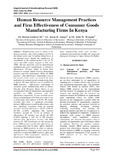| dc.description.abstract | Manufacturing sector is salient to the
Kenyan economy, with a total workforce of 13% in
the formal sector and 1.4 million labour-force in
the informal sector. Despite the significance, its
contribution to the regional market is low at 7%
export and GDP remains stagnant at 10% since
1960s. This has raised the concerns about Kenyan
manufacturing sector’s performance in relation to
effectiveness. Previous studies in Kenya have
focused on strategic human resource management
practices and firm performance. While the HRM
practices - firm effectiveness relationship is key to
the growth of any sector, no research has been
undertaken in consumer goods manufacturing firms
in Kenya. The main objective was to establish the
HRM practices - Effectiveness relationship in
consumer goods manufacturing firms in Kenya.
Drawing from Resource Based theory, it was
conceptualized that the independent and dependent
variables are HRM practices; and firm
effectiveness respectively. A cross sectional survey
design and population of 65 firms were used. It was
a census study with response at 76.9%. The results
revealed that there is significant association
between HRM practices and firm effectiveness with
most significant association being on material
incentives and firm effectiveness with R2 of 66.9%
(β=.303, p<0.01), indicating that material
incentives account for 30.3% of variance in
effectiveness. R2 increase was 46.2% (β=.509,
p<0.01) implying a unit rise in HR practices
enhances firm effectiveness increase with HRM
practices by .509. Conclusions are that among the
firms, HRM practices predict firm effectiveness. It
is recommended that the firms’ efforts should be
directed on HRM practices in order to enhance
firm effectiveness. Contrary to prior research, this
study has revealed that HRM practices, affect firm
effectiveness. Other performance indicators and
designs may be considered in future. | en_US |

